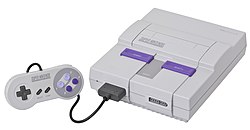Super Nintendo
|
|
|
|
Top: North American SNES (circa 1991)
Bottom: Japanese Super Famicom, which has the same casing later used in European and Australian consoles. Other variations are pictured under Casing below |
|
| Also known as | SNES Super NES |
|---|---|
| Manufacturer | Nintendo |
| Type | Home video game console |
| Generation | Fourth generation |
| Release date | |
| Retail availability | 1990–2003 |
| Introductory price | ¥25.000 $199 |
| Discontinued | |
| Units sold | Worldwide: 49.10 million North & South America: 23.35 million Japan: 17.17 million Other: 8.58 million |
| Media | ROM cartridge |
| CPU | Ricoh 5A22 @ 3.58 MHz |
| Sound | Nintendo S-SMP |
| Online services | Satellaview (Japan only), XBAND, Nintendo Power (Japan Only) |
| Best-selling game |
|
| Predecessor | NES |
| Successor | Nintendo 64 |
The Super Nintendo Entertainment System (officially abbreviated the Super NES or SNES, and commonly shortened to Super Nintendo) is a 16-bit home video game console developed by Nintendo that was released in 1990 in Japan and South Korea, 1991 in North America, 1992 in Europe and Australasia (Oceania), and 1993 in South America. In Japan, the system is called the Super Famicom (Japanese: スーパーファミコン Hepburn: Sūpā Famikon?, officially adopting the abbreviated name of its predecessor, the Famicom), or SFC for short. In South Korea, it is known as the Super Comboy (슈퍼 컴보이 Syupeo Keomboi) and was distributed by Hyundai Electronics. Although each version is essentially the same, several forms of regional lockout prevent the different versions from being compatible with one another. It was released in Brazil on September 2, 1992, by Playtronic.
The SNES is Nintendo's second home console, following the Nintendo Entertainment System (NES). The console introduced advanced graphics and sound capabilities compared with other consoles at the time. The development of a variety of enhancement chips integrated in game cartridges helped to keep it competitive in the marketplace.
The SNES was a global success, becoming the best-selling console of the 16-bit era despite its relatively late start and the fierce competition it faced in North America and Europe from Sega's Genesis/Mega Drive console. The SNES remained popular well into the 32-bit era, and continues to be popular among fans, collectors, retro gamers, and emulation enthusiasts, some of whom still make homebrew ROM images.
...
Wikipedia


